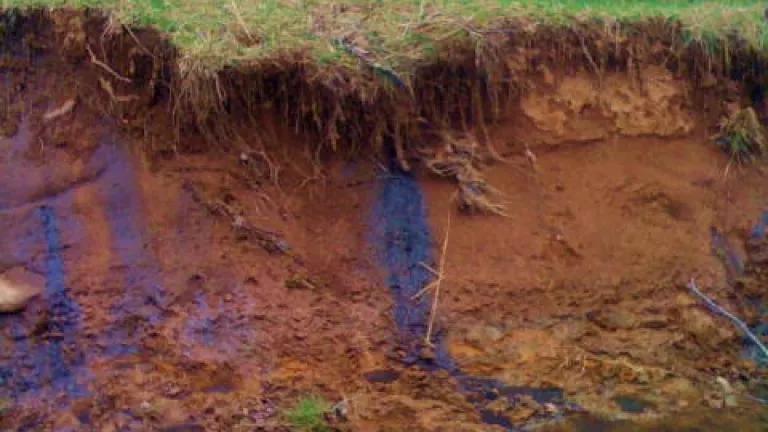
I recently blogged about Leann Kiner in Harrison County, West Virginia, who found out that her water was contaminated with arsenic from her neighbor--not state regulators or the natural gas producer. When I spoke to Leann on the phone, she told me about more environmental destruction from natural gas activities near her home.
One well next to her home, known as the O. Rice pad, was built in wetlands. The U.S. EPA found that the site was in violation of the Clean Water Act. Another site near her home, the Hill Site, also violated the Clean Water Act for discharging pollution into waters of the United States. In addition, the West Virginia Department of Environmental Protection (DEP) found four legal violations on this site--a torn pit liner and excessive run-off causing sedimentation (a serious form of water pollution).
Leann also observed some drilling-related contaminants leaking into a stream near the O. Rice pad, apparently from beneath the ground surface. Check out this photo--who thought it would be a good idea to construct a wellpad so close to a stream, and directly uphill? This is a wetlands. Does that plastic barrier given anyone comfort that the stream is protected from a serious spill or runoff? This seems like a bad spot to permit a wellpad in the first place:
Photo used with permission, credit: Leann Kiner
The EPA and DEP databases reveal many more violations in West Virginia (although this information can be hard to find). Why isn't the oil and gas industry preventing these violations? There need to be much stronger enforcement systems, and penalties high enough to prevent repeated infractions. Vigilant citizens should not have to devote their precious spare hours to policing an industry that has severely damaged what were once prized spots for quiet fishing, summer swimming, and family picnics.
To help shine a spotlight on what is happening in rural West Virginia, there is a new grass roots program called the West Virginia Host Farms Program, a volunteer-based initiative of the West Virginia Landowner Alliance, Inc. The program provides opportunities for researchers, including journalists, scientists, and others, to study the impact of natural gas drilling in the state. The Host Farms include West Virginia landowners who live on or in close proximity to land where Marcellus wells are already drilled, drilling and fracking is currently taking place, compressor stations are located, or where such activity is proposed to take place in the near future. The Host Farms offer access and a place to stay while researchers study the effects of Marcellus drilling and fracking on the environment. We definitely need a lot more first-hand research and this project will help.

